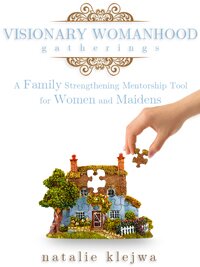Written by Natalie, Editress of Visionary Womanhood
I originally jumped at the opportunity to review Good Mood, Bad Mood: Help and Hope for Depression and Bipolar Disorder by Charles D. Hodges, in hopes of gaining insights that could be applicable for people in my current life, as well as for any future contacts that may come across my path in need of direction or help in this area. I wanted to learn more about depression and bipolar disorder since so many people are being diagnosed with these problems and are looking for hope and healing.
By some estimates, over 25 percent of the U.S. population will carry the label of depression, anxiety, or bipolar disorder at any given time. pg.20
God used this book to encourage me in my own thinking on this topic. To confirm the truth that He does have answers for all of life. That though there are confusing health issues that can involve the brain, there are also health issues affecting us that are simply rooted in sadness over the disappointments and heartaches in life. And distinguishing between the two may not be as difficult as we might think.
Dr. Hodges defines the terms, explains the diagnosis process, and gives a Biblical alternative for healing. One of the things he examines is whether or not depression really is a disease. He explains that in order to have a diagnosis that is not just based on subjective opinion, there must be pathology involved. In other words, there must be “negative changes in organs, tissues, or systems.” (pg. 39)
Unfortunately, many people are diagnosed with depression or bipolar disorder based on the subjective opinions of their well-meaning doctors. They then turn to medication to relieve them of their symptoms, but unless there is a serious brain disorder going on, the medication doesn’t do much to help. Far too many people continue to suffer without real answers.
“Most who struggle with sadness will look for a medical solution. In our society, this is a reasonable expectation. The problem is that 90 percent do not seem to benefit.”
I appreciated his analysis of how and why we so easily turn to a diagnosis of depression in our culture.
“Depression has become a very different thing than it was before 1950. People born before 1950 had a much lower rate of depression than those born after that year. Out of those born before 1955, only 1 percent would have a major depressive episode before age seventy-five. Among those born after 1955, 6 percent would have a major depressive episode by age twenty-five.
There are lots of explanations for the rise in depression diagnoses, but it makes me wonder why my parents, grandparents, and great-grandparents could suffer through multiple world wars and unprecedented economic depression without getting depressed. This book has attempted to make a good case for the idea that people today, people in medicine, psychology, and society in general mistake sadness for depression.
Another explanation also deserves consideration. While we are mislabeling sadness as depression, it is also possible that we have lost our ability to respond to sadness in a way that turns it into a productive emotion which drives us to useful change. Researchers suggest that the changes in our families over the last fifty years have left us more vulnerable and less supported when difficult times come.
Martin Seligman came closest to the truth when he said:
‘One cause of depression is a tendency to magnify the effects of setbacks…To the extent you see a failure as something that is lasting and which you magnify to taint everything in your life, you are prone to let a momentary defeat become a lasting sense of hopelessness…But if you have a larger perspective, like a belief in God and an afterlife, and you lose your job, it’s just a temporary defeat. You know that justice will prevail in the long run and you don’t plummet into depression.’ (Goleman, A Rising Cost of Modernity: Depression)
Americans today are far more receptive to the idea that depressed moods come from disease than they were in 1950. ..The idea that anyone who is sad for more than two weeks may suffer from a mood disorder is not as American as apple pie….We are told that it is not reasonable for anyone to suffer sadness. It is viewed as needless pain.”
One of the things Dr. Hodges examines is whether or not there is anything good about sadness. Here’s what he comes up with:
1. Sadness is one of the first signs that help is coming!
2. Sadness and suffering drive us to grace
3. Sadness opens the door to change
4. Sadness opens the door to repentance
5. Sadness equips us for service
We all want relief from our burdens. Dr. Hodges argues that if that is our goal, we may be disappointed and driven to further despair. He challenges his patients to make this their goal instead:
“I want to glorify God with my life more than I want to breathe.”
When someone asked Jesus what the great commandment was, He replied, “You shall love the Lord your God with all Your heart, and with all your soul, and with all your mind. This is the great and foremost commandment. The second is like it, you shall love your neighbor as yourself.”
We need to love God more than “health, safety, school, husband, children, houses, cars and anything else…”
“Do you want to exchange your sadness for joy? Then do what Jesus did. Because of the new life He purchased for us on the cross, we have the Holy Spirit to enable us to follow Jesus in this way. Ask Jesus to change your heart. Humble yourself and serve others. Stop worshiping your own comfort and focus on the comfort of others. That is what Jesus did when He refused to think of His own needs, but instead thought about ours. The only way to have happiness or joy in this life is found in serving Jesus and others instead of serving self. So Jesus said, “Now that you know these things, happy are you if you do them.” For the Christian, the most direct way to exchange sorrow for this blessed, joyful happiness is to do what you know the Scriptures say we should.”
I realize this paragraph may sound like a trite solution at first glance, but the author really does take the reader into the Scriptures to examine men and women who also suffered and found relief through a surrender of their lives to God. I felt like he was gentle and truly compassionate toward those who struggle just to get through a day. His heart is to help people find real answers and real relief that can only come from our Creator.
What if we could view sadness from God’s higher perspective? Dr. Hodges spends a considerable part of his book examining this.
“Instead of the biological-genetic determinism deciding our future, the consistent message of Christianity is that “if anyone is in Christ, he is a new creature; the old things passed away; behold, new things have come.” (II Corinthians 5:17)
“When we choose to see sorrow the way God intends, we do not sorrow as those who have no hope. Godly sorrow leads to changes in our mind’s perspective and our heart’s priorities. The sorrow of the world often leads to deadly detours in living.”
Dr. Hodges concludes his book by discussing the link between depression and bipolar disorder as well as explaining the difference between the serious disease, bipolar disorder 1, which often requires medication to control – and the more commonly diagnosed (and misdiagnosed) and not-so-serious bipolar disorder 2.
If you struggle with depression or have loved ones who do, this is an educational, compassionate, Biblical look at the issue.










Fabulous review Natalie! Always glad to have you in another blog tour. Whenever you need more books to read, you know where to find me.
Shaun Tabatt
Cross Focused Reviews
Thank you for the opportunity Shaun!